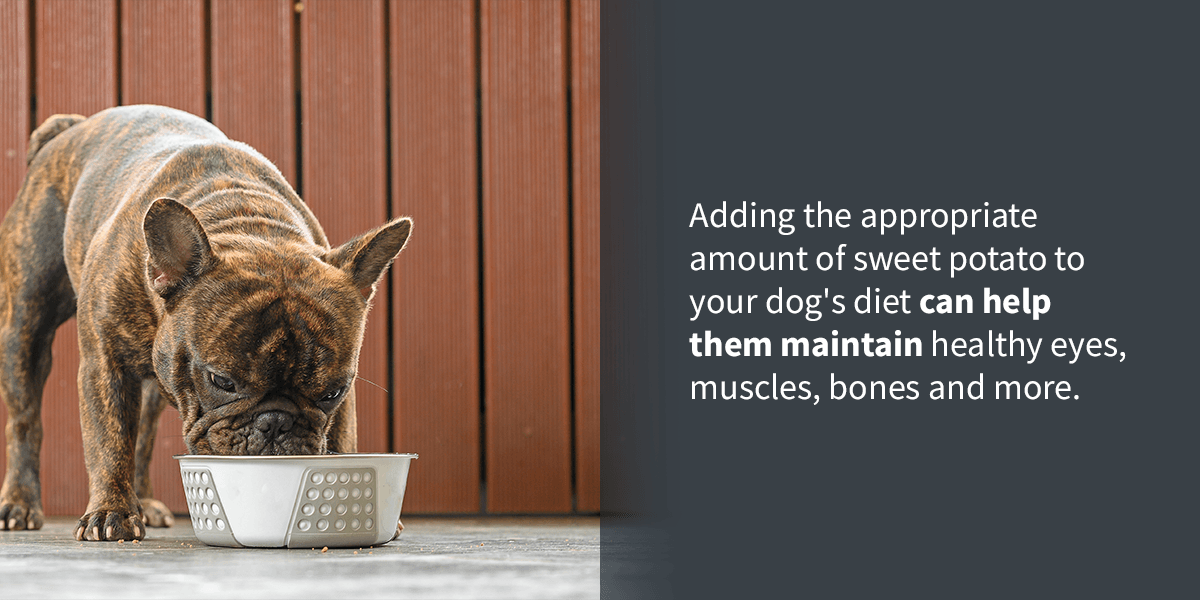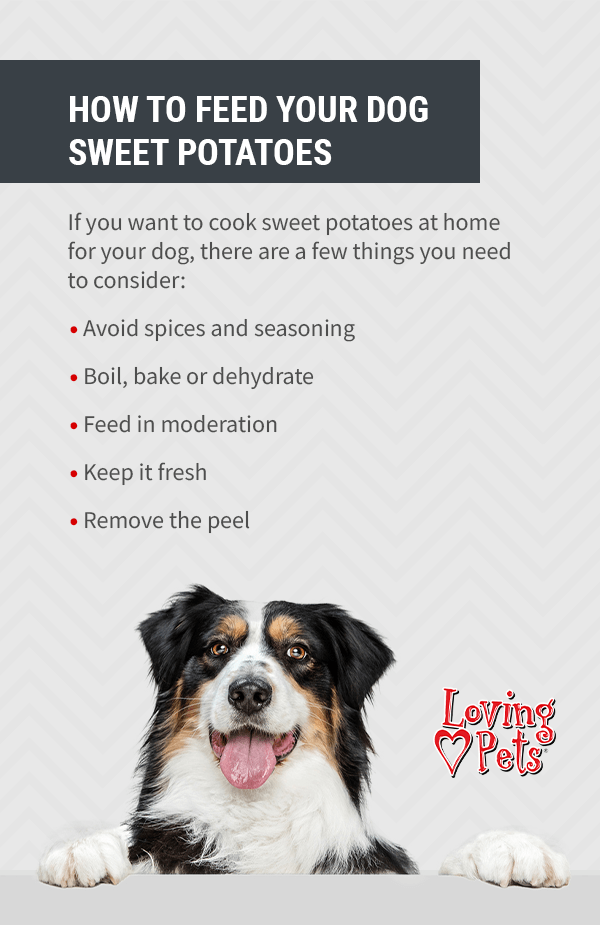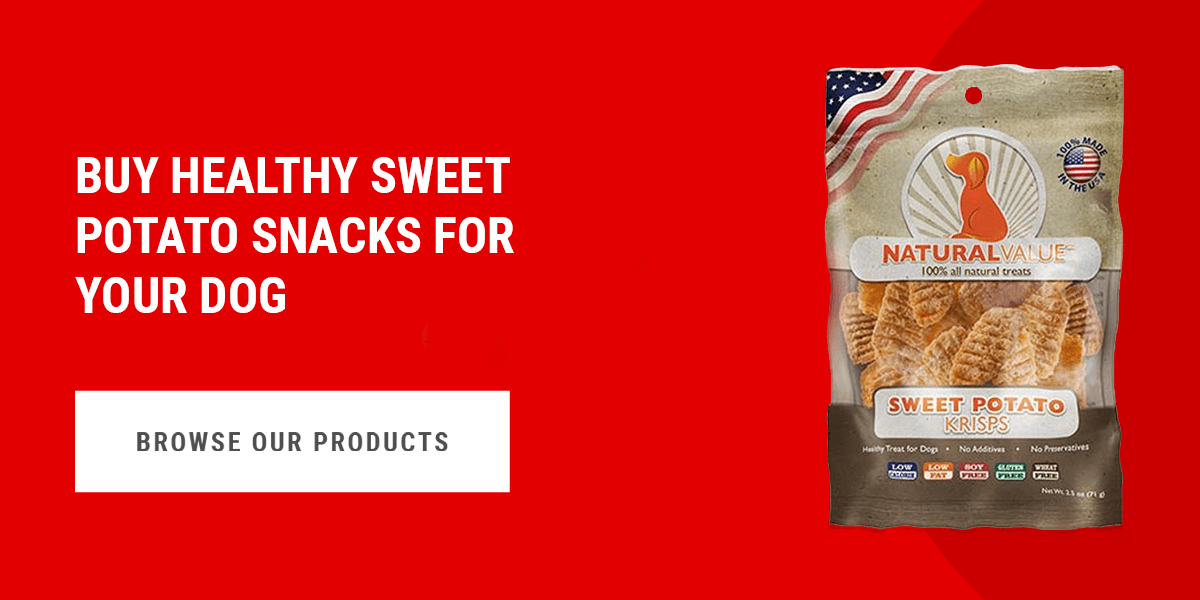The Benefits of Sweet Potatoes for Dogs
We all love sweet potatoes. They are a healthy superfood that many add to their meals in place of regular potatoes or to get in a satisfying starch. Many of the benefits we get from this delicious vegetable can also apply to our dogs. Sweet potatoes are full of vitamins and minerals that can positively impact your dog's health.
However, before you rush to start feeding your dog this healthy treat, you need to know a few things. While sweet potatoes can have numerous benefits, there are a few things to consider, like which parts of the potato you can feed them. For example, sweet potato skins can be challenging for dogs to chew and digest, making them a choking hazard.
Let's look at the potential health benefits and considerations surrounding feeding your dog sweet potatoes.
Can Dogs Eat Sweet Potato?
The short answer is yes and no. Sweet potatoes can have fantastic health benefits for your dog when prepared correctly. Raw sweet potatoes can pose a risk to your dog. Cooked and peeled sweet potatoes are a great treat to add to your dogs' food, but avoid fried or raw sweet potatoes. Here is a rundown of the different forms of sweet potato your dog can eat:
- Baked: When you bake a sweet potato for your dog, avoid toppings such as butter, salt and pepper. These toppings can be unhealthy for dogs, especially if given to them often. Dogs will still enjoy the sweet potato treat without any toppings.
- Boiled: Boiling sweet potatoes is one of the healthiest ways to introduce this yummy treat to your dog's diet. When you boil a sweet potato, you can break down some of its starches and lower its glycemic index (GI) value. The lower the GI of a food, the less impact it can have on your dog's blood sugar levels.
- Biscuits and chews: Sweet potatoes can be used as an ingredient in dog biscuits and chews. They are a healthy additive that can offer many potential benefits to dogs.
- Dehydrated: Use an oven or dehydrator to make dehydrated sweet potato chews or treats. In an oven, "bake" sweet potatoes at a low temperature for a few hours. Use the dry sweet potatoes as a homemade treat or a topper for food.

Always peel baked or boiled sweet potatoes before giving them to your dog. The peels can become a choking hazard because they are difficult to chew. Sweet potato peels can also be more challenging for dogs to digest, leading to digestive issues.
Can Dogs Eat Raw Sweet Potatoes?
No, dogs cannot eat raw sweet potatoes. Or fried sweet potatoes. Raw and fried sweet potatoes can cause your dog to develop health issues such as intestinal blockages and pancreatitis. Here is why you should avoid giving your dog raw or fried sweet potatoes:
- Raw: Raw sweet potato is fibrous, making it difficult for your dog to digest safely. If you give your dog lots of raw sweet potato, the slowly digested parts can build up and create an intestinal blockage. Even a minor amount of raw sweet potato can cause problems for your dog, especially if they are a small breed. If your dog does manage to eat some raw sweet potato, watch for symptoms of an intestinal blockage, including vomiting, loss of appetite, difficulty with bowel movements and lethargy. Take your dog to the vet as soon as possible if you notice these symptoms, as intestinal blockages can be fatal for dogs.
- Fried: Any fried food can be dangerous for dogs to ingest. Fried sweet potatoes are high in unhealthy fats due to the oil and salt from any seasonings. Eating too many fried sweet potatoes can cause your dog to become obese and develop pancreatitis. Some dogs may also bloat, a medical condition where your dog's stomach fills with gas and starts to twist.
How Much Sweet Potato Can My Dog Eat?
Using sweet potatoes as a treat should be done in moderation. You can feed your dog a few ounces of cooked sweet potato, depending on their size and breed. Sweet potato is high in carbohydrates, with nearly 20 grams of carbs per 100 grams of sweet potato. While dogs can obtain much of their energy from carbohydrates, too many carbs can lead to obesity.
Consider your dog's dietary needs based on their breed, level of activity, age, current diet and overall health before deciding how much sweet potato to give them. Like humans, canine nutrition should be tailored to your dog's needs. Remember, when introducing new foods to your dog's diet, always give them a small piece first to see if they react.
While sweet potato has many potential health benefits, feeding your dog too much can also cause problems. You can also check with your vet about adding sweet potatoes to your dog's diet. They will be able to give you a clearer idea of how much and how often you can offer your dog sweet potato treats.
Why Sweet Potatoes Are Good for Dogs: Potential Health Benefits
Sweet potatoes are good for your dogs because they are filled with vitamins and antioxidants that are essential to your dog's health. Considered a superfood, many humans add sweet potatoes to their diets for their health benefits. Many of these benefits also apply to dogs. Adding the appropriate amount of sweet potato to your dog's diet can help them maintain healthy eyes, muscles, bones and more. As they are packed full of antioxidants, sweet potatoes can also be an additional line of defense against certain cancers and heart diseases.

On top of all these health benefits, sweet potatoes contain properties that may help reduce irritation, making them an excellent choice for dogs with food allergies or sensitivities. Here are three potential health benefits of sweet potatoes for dogs.
Vitamins for Healthy Growth
Sweet potatoes are packed with several essential vitamins that each play a role in keeping your dog healthy. Here are the main vitamins in sweet potatoes and how they can help keep your dog in top shape:
- Beta-carotene: Dogs convert beta-carotene into vitamin A, which can help dogs maintain healthy eyes, muscles, nerves, skin, bones and coats.
- Vitamin B6: This is a crucial vitamin for dogs. It can help with glucose generation, hormone regulation and immune response. Vitamin B6 can also assist in your dog's nervous system functioning.
- Vitamin C: Like in humans, vitamin C can boost your dog's immune system. Vitamin C may promote the creation and growth of white blood cells to support your dog's immune system, which can be particularly useful for older dogs or dogs with compromised immune systems.
- Potassium: An electrolyte like potassium can help dogs maintain healthy energy levels and replace lost electrolytes. Potassium may also aid in the proper functioning and development of your dog's heart, nerves and muscles.
- Calcium: This mineral can aid in the growth of a puppy's bones, muscles and nervous system. Even in older dogs, calcium may support the healthy functioning of these parts.
Disease Fighting Antioxidants
Another thing sweet potatoes are full of is antioxidants. Antioxidants are known to protect against free radicals that can cause cancer and heart disease. For years, humans have been investigating the benefits of antioxidants for themselves and now they can also benefit your loved pets. Antioxidants can help prevent free radicals from damaging the healthy cells in your dog, helping them stay healthy.
The main antioxidant in orange, yellow or gold sweet potatoes is beta-carotene. This antioxidant is also found in other vegetables, including carrots, pumpkins and red and yellow capsicum. Beta carotene can protect against some cancers and heart diseases. As one of the highest sources of beta-carotene, sweet potatoes can help keep your dog's heart healthy by reducing the risk of heart disease.
Purple sweet potatoes also contain antioxidants, namely anthocyanin pigments. These antioxidants have minor immune-boosting properties and can reduce inflammation. Due to this, sweet potatoes can be a healthier treat alternative for dogs with food sensitivities.
Fiber for Digestive Health
Sweet potatoes are high in fiber. In fact, they are one of the vegetables with the highest amounts of fiber. Fiber can help your dog's digestive system function more effectively. If your dog is struggling with constipation or diarrhea, some cooked sweet potato added to their food or as a treat can help regulate their bowel movements. High fiber levels may also help keep your dog feeling fuller for longer, making them an ideal addition to any weight management plan for dogs.
Potential Health Concerns
Sweet potatoes are not bad for dogs, but there are a few health concerns to keep in mind. Sweet potatoes are a carbohydrate, so feeding your dog too many can lead to obesity and other health problems. Knowing the potential risks of sweet potatoes can help you determine if they are an appropriate addition to your dog's diet.
These are three potential health risks associated with sweet potatoes:
High Glycemic Index
Sweet potatoes can have a high glycemic index depending on how they are cooked. This can cause your dog's blood pressure to spike when they eat sweet potatoes, causing them to release insulin to manage this sudden increase. While sugar can provide energy for your dog, it is essential that you monitor how much sweet potatoes they eat, especially if they are diabetic or overweight.
Even in healthy dogs, eating too much food with a high glycemic index can lead to health problems after enough time.
Intestinal Health and Weight
Never feed your dogs raw sweet potato. As mentioned earlier, raw sweet potato can lead to intestinal blockages and constipation. Sweet potatoes also have a moderate sugar level, which can negatively affect your dog's gut health. Feeding your dog too many sweet potatoes can cause their stomachs to become upset, especially if your dog has never eaten them before. When introducing sweet potatoes to your pet's diet, watch out for any signs of digestive upset, such as vomiting or diarrhea.
The high levels of sugar and carbs in sweet potatoes can also lead to weight gain and diabetes in your dog. Always feed your dog sweet potatoes in moderation and monitor their weight. If you notice they pick up weight unexpectedly, try cutting out the sweet potato.
Allergic Reactions
As with any food, there is the potential for dogs to have an allergic reaction to sweet potatoes. Even with the anti-inflammatory properties of this super vegetable, some dogs may react to it. When you add sweet potato to your dog's diet, keep an eye out for possible signs of an allergic reaction, including itchiness, ear inflammation, vomiting and loose stool.
How to Feed Your Dog Sweet Potatoes

Giving your dog sweet potato as a healthy treat can provide several health benefits. There are a few ways you can add this superfood to their diet, from chews and treats to adding boiled sweet potatoes to their food. You can either cook sweet potato at home for your dog or buy treats, food and chews that contain sweet potato.
If you want to cook sweet potatoes at home for your dog, there are a few things you need to consider:
- Avoid spices and seasoning: While we may like extra salt, pepper or marshmallows on our sweet potatoes, these extras can negatively impact your dog's health. Stick to plain sweet potatoes mixed in with food or as a quick treat.
- Boil, bake or dehydrate: Never feed your dog raw sweet potato. This is crucial to remember when feeding your dog because of the associated health risks. You can add mashed sweet potato to food or make chews out of dehydrated slices.
- Feed in moderation: As with any treat, limit how much you give your dog. Add a few ounces of cooked sweet potato to one meal a day or give your dog a few treats.
- Keep it fresh: Try and avoid using canned sweet potatoes. Preservatives or additives such as xylitol can be dangerous for your dog. Instead, buy fresh sweet potatoes or try growing your own.
- Remove the peel: Sweet potato peels can be difficult for dogs to chew and digest, possibly causing them to choke or creating an intestinal blockage.
Buy Healthy Sweet Potato Snacks for Your Dog
Sweet potatoes are an amazing superfood that can benefit you and your dogs. Before you add sweet potatoes to your dog's diet, consider all the health benefits and concerns. Speak to your vet about the best way to integrate this vegetable into your pet's diet for the best results.
Loving Pets creates and develops innovative treats for your pets. We pay close attention to all the ingredients added, including sweet potato, so your pets have healthy treats they will love. Browse our range of sweet potato treats today!




